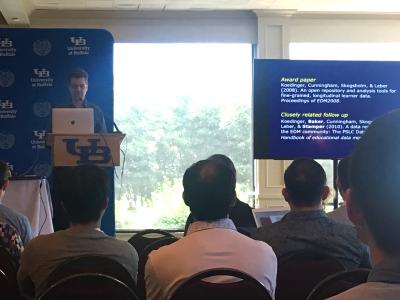Several from HCII Involved with 2018 Educational Data Mining Conference

From speaking to event planning, three members of the Carnegie Mellon University Human-Computer Interaction Institute contributed to the 11th annual Educational Data Mining Conference held in Buffalo, NY, Sunday, July 15 through Wednesday, July 18, 2018.
Jodi Forlizzi, professor and Geschke Director of the HCI Institute, gave a keynote presentation. Another HCII faculty member, Kenneth Koedinger, professor of HCI and psychology, accepted an award and presented two papers and a poster. Michael Yudelson, visiting researcher at the HCII and senior research scientist, ACT, Inc., served as an EDM conference program co-chair.
On Monday afternoon, Koedinger chaired the Advancing Theories of Learning session, where there were two Carnegie Mellon University papers: “Analyzing the Relative Learning Benefits of Completing Required Activities and Optional Readings in Online Courses” (pdf) by Paulo Carvalho, Min Gao, Benjamin Motz and Koedinger, and “Is the Doer Effect Robust Across Multiple Data Sets?” (pdf) by Koedinger, Richard Scheines and Peter Schaldenbrand.
The CMU team of Koedinger, Lu Sun and Elizabeth McLaughlin presented “Using a Hierarchical Model to Get the Best of Both Worlds: Good Prediction and Good Explanation” in the Monday evening poster session.
Forlizzi’s keynote address, "Data, design, and education: Where are we going?," took place on Tuesday morning.
Although a designer being an invited speaker at a data mining conference might sound like an unlikely combination, the reality is that the recent availability of massive amounts of data is having an impact on the discipline of design. Forlizzi provided examples to illustrate some benefits and drawbacks that the recent abundance of data has had on designing educational games.
“When picking keynote speakers, the co-chairs decided to extend invitations to not only core EDM researchers, like Tiffany Barnes, but those who work on issues of no lesser importance to education. Jodi’s focus on design in general and design for learning and data [mining] implications that stem from that was a great example of such a topic,” said Yudelson.
The award ceremony took place Tuesday afternoon where Koedinger provided the acceptance speech for the “Test of Time” award he won the previous year. The EDM “Test of Time” award is given to a paper that was published 10 years ago, and has been particularly influential to the field. The award-winning 2008 paper was “An open repository and analysis tools for fine-grained, longitudinal learner data” by Koedinger, Cunningham, Skogsholm and Leber.
On Wednesday, the final day of there conference, Yudelson facilitated conversation among four industry professionals as the chair of the panel discussion.
Yudelson’s participation can be attributed to EDM president Mykola Pechenizkiy who drafted him as a 2018 program chair.
“Program chairs find track chairs and work with them to organise the process of submission, review, and acceptance of various kinds. Organizing conferences is a public service academic and industry researchers do. While it could seem to be some sort of volunteering, it does provide a chance to network, practice organizational skills, and increase visibility,” Yudelson said.
Yudelson did enjoy the experience, often splitting the duties with co-chair Dr. Kristy Boyer, a long time EDM attendee and a previous co-chair of EDM 2016 in Raleigh, NC.
Koedinger is next up for service to the organization. He is president elect of the International Educational Data Mining Society (IEDMS) and will assume the position when the current president steps down following EDM 2019.
Several other HCII faculty, postdocs and students were in attendance at the conference.

